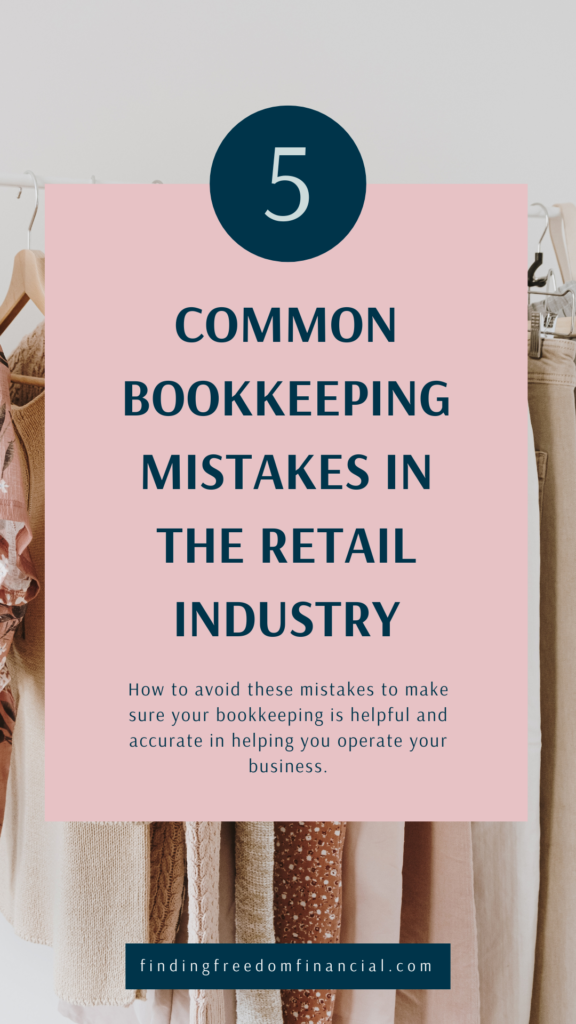5 Common Bookkeeping Mistakes in the Retail Industry

FYI…sometimes I use affiliate links for the resources I love. This means that I may earn a small commission at no extra cost to you. And hey, some of them even include a discount for you!
Bookkeeping in the retail industry has some unique complexities that require some specific knowledge and experience to fully understand. Since I opened my business in 2021, I have worked with dozens of small businesses, and I often see a lot of small business owners make similar mistakes when they manage their own bookkeeping. Unfortunately, mistakes like these can lead to inaccurate financial reports, which lead to inaccurate tax returns.
Today, I want to share what these common bookkeeping mistakes are and help you avoid these mistakes to make sure your bookkeeping is helpful and accurate in helping you operate your business and prepare for taxes.
What are these common bookkeeping mistakes?
Mistake #1: Not Doing It
Yes, this deserves a whole section on its own. Who’s guilty of this one?
Either you just don’t know what you’re supposed to be doing, and you don’t have the time to do it right now, so it keeps getting pushed down your to-do list.
Or maybe you just HATE doing it, so you keep putting it off.
Either way, you can only NOT do it for so long – there’s a tax deadline every year. And the longer you put it off, the larger the “project” becomes, and the more stress and anxiety it seems to cause.
The solution: Schedule just 15 minutes every Monday morning to focus on organizing receipts and categorizing your transactions from the prior week.
Mistake #2: Using Spreadsheets
This is often a cost-effective and ‘simple’ way for a small business owner to track their business finances, but let me tell you – you are WASTING your time!
A software is going to be a MUCH more effective use of your time, and there are 3 popular options: Quickbooks Online (QBO), Xero, and Wave. QBO is a favorite across business owners (and myself),
Xero is a more cost-effective solution (but not quite as user-friendly IMO), and Wave is free and a great place to start if you’re trying to cut costs. Just remember that features will be limited with a free software.
The solution: Sign up for a bookkeeping software, and start doing your bookkeeping in that going forward. You will eventually want to get everything in there from January 1st forward so your full year of data is easily accessible and organized for tax time next year.
Mistake #3: Mixing Business & Personal Funds
Sometimes your business may have started out as a hobby or “side hustle”, and eventually you realize this could be a real business. By that point, you had all your expenses and income flowing through your personal bank accounts, and it just seems like a headache to get it all switched over now.
There are 2 main problems with this:
(1) You’re overcomplicating your bookkeeping and you won’t be able to fully utilize the features and tools that a software can provide
(2) If you operate as an LLC, you could be voiding the protection that your LLC provides – a term called “piercing the corporate veil”
The solution: Open a separate business bank account and credit card and start moving all your deposits and expenses to start flowing through those accounts instead. They don’t even really need to be labeled “business” accounts – but be sure they are accounts that you use strictly for business-related transactions
Mistake #4: Recording your Deposits as Gross Sales
It’s important to note that the amounts actually deposited into your accounts from your sales/payment platforms are the net amount of several factors…
Gross Sales – Discounts – Refunds + Shipping Income + Sales Tax – Processing Fees = Deposited Amounts
Each of these separate amounts needs to be accounted for in your bookkeeping records. Remember starting in 2024 (at least that’s the current plan – it’s been pushed back already), payment platforms are going to be required to send you a 1099 tax document if you’ve received over $600, so it’s going to be even more important that the numbers you report on your taxes are accurate.
The solution: Ensure that you have your bookkeeping software set up so you can accurately track each of the pieces mentioned in the formula above, and be sure to consistently compare reports from your sales platforms to your bookkeeping software to ensure everything is being recorded accurately.
Mistake #5: Recording Every Transaction as Either Income or Expense
As I’m sure most of you know, income and expense items are reflected on your income statement. But, 3 types of transactions aren’t reflected on the income statement:
(1) Assets – things you own.
This is money in your bank accounts, inventory you have on hand, equipment you use in your business, etc…
(2) Liabilities – things you owe
This is a balance on your credit card, sales tax you’ve collected from customers that you need to remit to the state agency, outstanding balances on loans or lines of credit, etc…
(3) Equity – the “book value” of your business
This is essentially what would be left over if you took all your assets and converted to cash (sold equipment and returned inventory, etc..) and used that money to pay off all your liabilities.
It’s also a reflection of the financial investment you have in your business.
There are some transactions that only affect these balance sheet accounts, and should not be reflected as an income or expense item on your income statement. Transactions such as…
…Paying off your credit card
…Paying your sales tax
…Purchasing inventory
…Paying yourself through Owner’s Draws
The solution: Review your bookkeeping to ensure you’ve been recording these types of transactions accurately, and they do not appear on your income statement.
Why does it matter?
As I mentioned earlier, mistakes in your bookkeeping lead to mistakes in your tax return. Some of these mistakes lead to you reporting a higher income on your tax return than you actually earned. This leads to you overpaying in taxes, so you have less money to pay yourself, or to reinvest back into your business.
Some of these mistakes lead to missed deductions, which will also lead to you overpaying in taxes. Having accurate bookkeeping helps you keep track of every single dollar you spend, and you can use those numbers to help you make smarter business decisions to help grow your business.
How can I avoid these common bookkeeping mistakes?
The best way to avoid these mistakes is to use a bookkeeping software like Quickbooks Online, and to learn some bookkeeping basics for yourself to understand how all the numbers work together. I’d love to invite you to join my free masterclass where I talk about a few of these mistakes in greater detail, and share some of those bookkeeping basics for you to begin to understand. You can register to watch it here!
How to learn more about these common bookkeeping mistakes
I have created a free download for you to grab for yourself so you can print these mistakes out, and work on correcting them if you are guilty of making them (no judgement if you are!). You can get your copy here. Let’s work on making this year the year you focus on your finances and have complete confidence in knowing your numbers.
Hi, I’m Megan!
Bookkeeping for the retail industry has some unique complexities that take extra time to manage to ensure accuracy. At Finding Freedom Financial Services, I provide done-for-you bookkeeping services for boutique owners that accurately track these complexities for you so you can have more time and focused energy to dedicate to running your stores. If you’re ready to get your time back, apply to work with me today!
